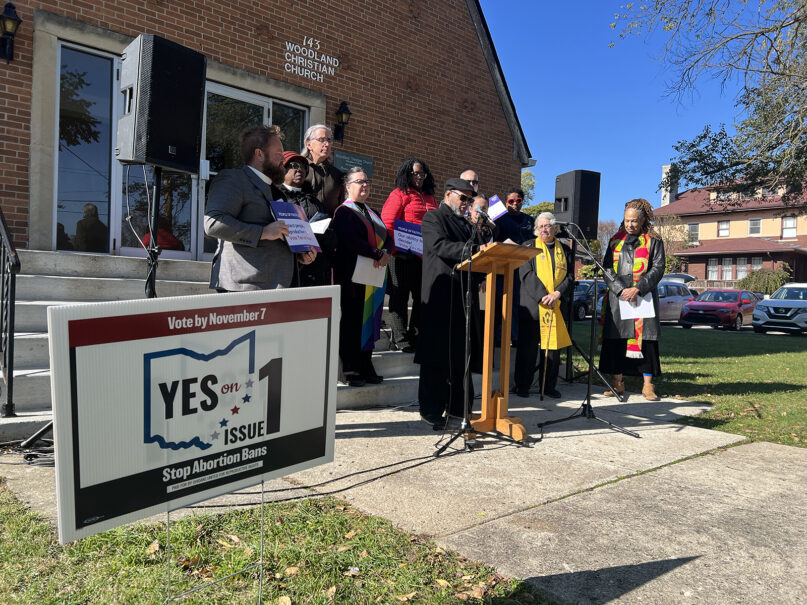(RNS) — As Ohioans have been preparing to vote on whether to amend Ohio’s constitution to include a right to abortion, the Rev. Eric Brown has been delivering sermons, attended and spoken at rallies, and led prayers urging his neighbors to come out to approve the referendum known as Issue 1.
Brown, pastor of Woodland Christian Church in Columbus, makes it clear that he believes that life begins at conception and says that “if the baby is born, and lives, that God has plans for that baby.”
But like many of the Black clergy who have spoken out about Issue 1 in the past months, Brown considers himself “pro choice and pro life.”
“I also understand that various women have problem pregnancies,” he told RNS. “We need to give women the freedom to choose, the freedom to consult with her obstetrician and her significant other if she has one, and with her God to make decisions with her reproductive health that she believes is best for her.”
According to the Rev. Lesley Jones, organizing director of the AMOS project, a network of clergy and congregations working for social justice in Ohio, Issue 1 has forced many Black clergy, traditionally perceived as more conservative than mainline Protestants on abortion, to come to terms in public for the first time about how their faith informs their positions.
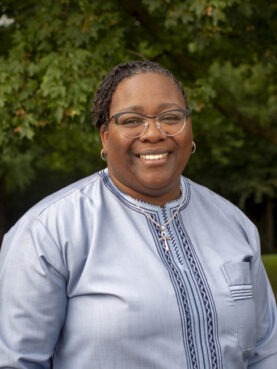
The Rev. Lesley Jones. (Photo by Katie Forbes)
“I think that there’s been a great deal of energy, seeking out and wanting another way to look at the issue,” Jones, who is pastor of Truth and Destiny United Church of Christ in Cincinnati, told RNS. “The real question from a lot of clergy has been, how do I maintain being pro life, and yet I am pro choice?”
The result, said Jones, is a “sophistication” in conversations about abortion in Black faith communities. Taboos about abortion are waning, in part because the growing number of women clergy have made reproductive health impossible to simply shun or ignore. In particular, Jones said, she is seeing more Black clergy who personally oppose abortion advocating against having those beliefs inscribed into law.
“I didn’t feel like I had to be a public advocate for abortion as long as abortion was legal,” Brown told Religion News Service. “But when Roe v. Wade was overturned, states began banning abortions down to six weeks or so, in some states it was 15, and the big problem for me was, no exception for rape, incest and life of the mother.”
The law that Issue 1 most directly addresses is the one signed by Ohio Governor Mike DeWine in 2019, which bans abortion when a heartbeat is detected, usually around six weeks — before most people know they are pregnant. The law, which does not include exceptions for rape or incest, was enforced for 82 days after the fall of Roe, but it has since been on hold as the courts determine its constitutionality. In the meantime, abortion is legal in Ohio until 22 weeks, the status it had under Roe v. Wade.
In August, Ohioans voted against a measure that would have raised the threshold for passing citizen-led ballot initiatives to amend the state’s constitution. Though the ballot initiative was widely seen as an effort to make it harder to pass the November abortion amendment, at the time, many Black clergy framed it as a question of voting rights, not reproductive ones.
White mainline pastors have been openly advocating for abortion rights, while Catholic bishops have worked hard to take the opportunity of Roe’s demise in the Dobbs v. Jackson Women’s Health Organization to establish a right to life in op-eds, video statements played in their dioceses and at Mass. The Archdiocese of Cincinnati put together a webpage of liturgical and information resources on the proposed amendment and has invited parishioners to participate in a 54-day Rosary Novena, a prayer of petition and thanksgiving that calls for the defeat of the amendment.
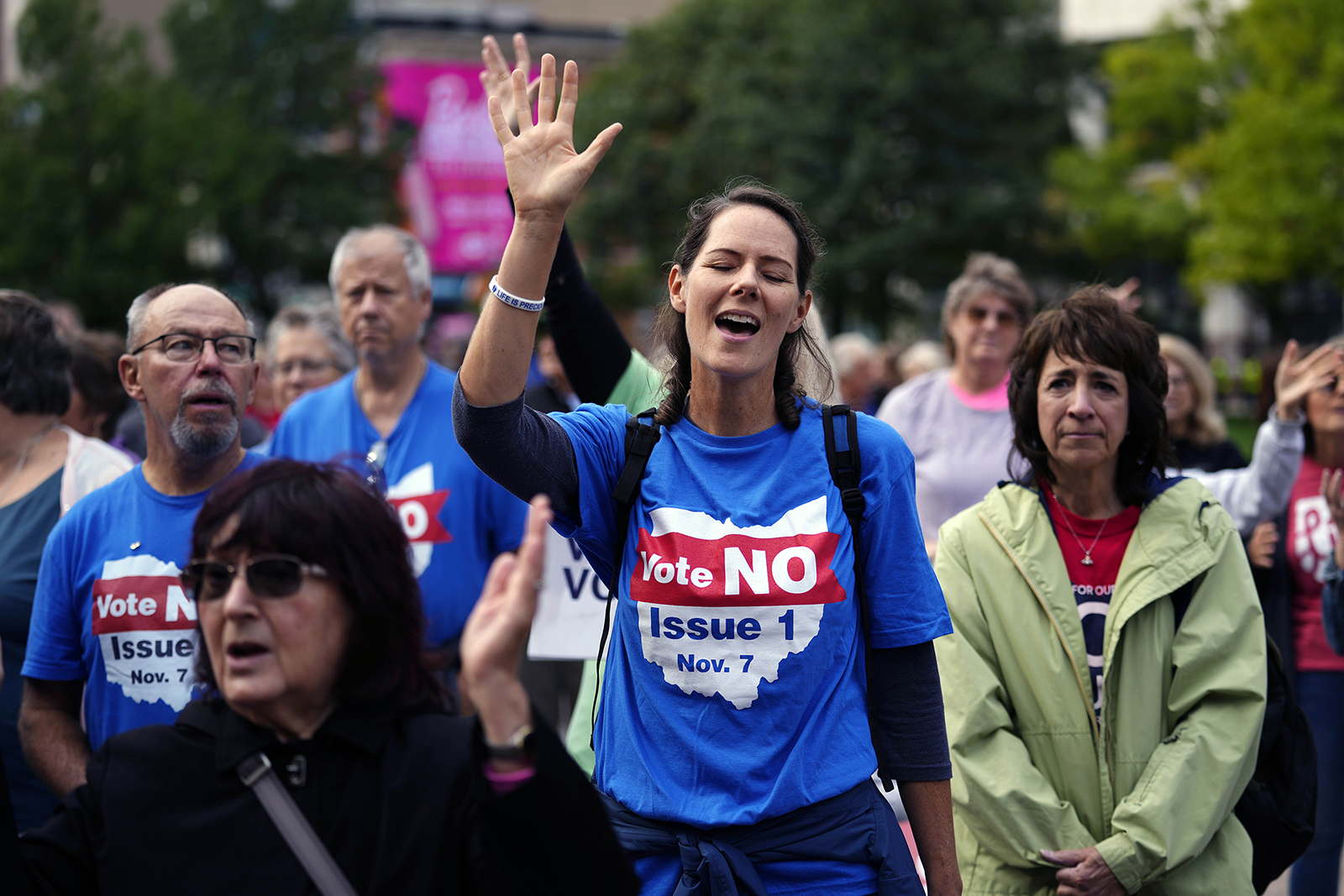
People gather and pray during the Ohio March for Life rally at the Ohio State House in Columbus, Ohio, Friday, Oct. 6, 2023. (AP Photo/Carolyn Kaster)
“All the bishops have used, and encouraged the use of, tremendous materials from our Catholic Conference of Ohio, which included prayers, homily helps, assistance with bulletins and bulletin inserts,” said Bishop Daniel Thomas of the Diocese of Toledo. “In that way, too, we’ve made a very unified effort. As a result, I think, please God, that will bear great fruit.”
Black faith leaders in Ohio who don’t support abortion have seen the new politics of abortion splitting the church, several told RNS. That reality saddens the Rev. David Forbes, pastor of Columbus Christian Center.
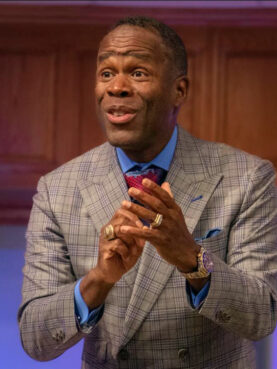
The Rev. David Forbes. (Photo courtesy Columbus Christian Center)
“Abortion, in its worst sense, is rejecting the image of God, is rejecting God himself, since he is the author and purveyor of life,” Forbes said. “Our intent to support life is to support that image of God, and to reject God is to reject him.”
Forbes, whose church partners with pregnancy centers that support parents before and after birth and before and after abortions, is one of 100 Black clergy who signed a letter urging Ohioans to vote no on Issue 1.
“Only 13 percent of Ohio’s population is Black, yet 48 percent of abortions undergone by residents of our state are performed on Black women — a tragic and difficult reality that our community cannot ignore,” the letter says. “Enough is enough. The Black community supports life.”
Through umbrella organizations like the anti-abortion group Ohio Right to Life, Protestant pastors opposing abortion have gotten encouragement from Ohio’s Catholic bishops.
The bishops’ strong opposition to Issue 1 has made it easier for Catholics to talk about the vote as well. “They’ve given us the freedom to be more open,” said the Rev. Eric Bowman, a Catholic priest at a parish outside Dayton, Ohio, and a longtime opponent of abortion. “In my 25, 26 years I’ve been in ministry, this is the most vocal I’ve seen the bishops of Ohio.”
In total, Catholic dioceses in Ohio have donated at least $1.4 million to combat Issue 1.
How the faith community in Ohio votes on Issue 1 will be an indicator of, as much as it will influence, the complex role religion plays in the abortion debate. While Catholics, who make up some 18% of Ohioans, are perceived as strongly anti-abortion, national polls of Catholics show the question divides them closely, figures touted by Catholics for Choice, an abortion rights group that bought space on more than 40 billboards across the state. One claims that “63% of Catholics support legal abortion in all or most cases.”
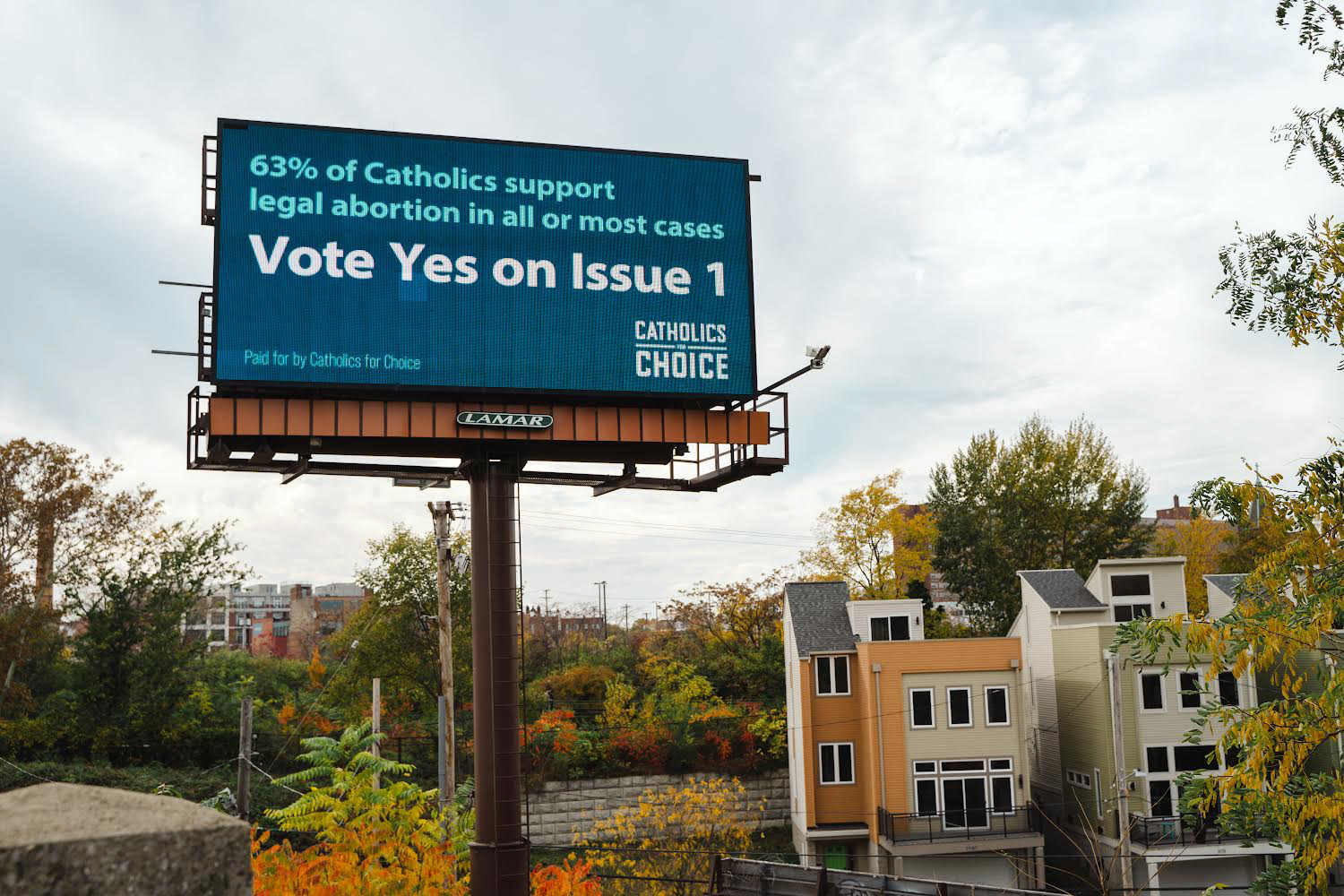
One of the billboards purchased by Catholics for Choice in Ohio campaigning in favor of Issue 1. (Photo courtesy Catholics for Choice)
“We’ve ceded the faith argument to the right wing for 50 years,” said Jamie Manson, president of Catholics for Choice. “Pro-choice people have got to take back this narrative, and we have to use the language of faith to encounter and react to the dominant, faith based anti-choice movement.”
Pastor Jones, of the AMOS Project, says that part of changing that narrative includes showing Ohioans that the abortion issue should be seen in light of Matthew 25, a chapter in the gospels where Jesus calls his followers to serve “the least of these.”
Part of that, said Jones, entails caring for those facing unintended pregnancies and a dearth of resources. Jones also believes God gives humanity free will, something she says is essential to preserve in the context of reproductive health.
